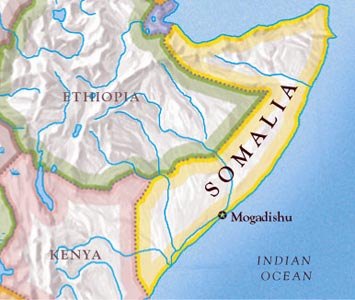Somalia MPs vote to double parliament, include Islamists
 Nairobi/Mogadishu - Somali members of parliament on Monday voted to double the number of seats in parliament from 275 to include moderate Islamists and civil society.
Nairobi/Mogadishu - Somali members of parliament on Monday voted to double the number of seats in parliament from 275 to include moderate Islamists and civil society.
The Islamist Alliance for the Re-Liberation of Somalia (ARS) will have 200 seats, while 75 members of civil society will take up the rest of the new seats.
The MPs, meeting in neighbouring Djibouti due to insecurity in Somalia, are also due to vote on whether to delay presidential elections due for the end of January.
ARS leader Sheikh Sharif Sheikh Ahmed is running for the presidency, along with current Prime Minister Nur Hassan Hussein.
President Abdullahi Yusuf Ahmed resigned in December after parliament thwarted his attempt to sack Hussein.
The UN Special Representative for Somalia, Ahmedou Ould-Abdallah, welcomed the decision, calling it "a positive step."
Some are hoping that the expanded parliament, a new president and the departure of unpopular Ethiopian troops that have been propping up the government for two years can increase the prospects of peace in Somalia.
However, Somalia remains in the grip of a bloody insurgency that some analysts expect to intensify in the absence of the Ethiopian forces.
Ethiopian forces invaded in late 2006 to help kick out the Islamic Courts' Union, a hardline Islamist regime that was in power for six months.
The invasion sparked a bloody insurgency that has killed an estimated 16,000 civilians and displaced around 1 million.
Ethiopia completed its pullout over the weekend, claiming victory over the insurgents.
Main insurgent group al-Shabaab, which along with hardline elements of the ARS has rejected the UN-backed peace process, in recent months seized huge swathes of territory as the government fell apart.
Rival Islamist militia have been fighting each other in recent weeks, while a suicide bombing in Mogadishu killed 15 civilians and a policeman and seriously wounded almost 40 others on Saturday.
Only an undermanned African Union (AU) force of around 3,000 troops from Uganda and Burundi remains to back government forces, although Uganda and Burundi have put two extra battalions on standby.
The AU is desperately trying to scrape up more troops but the UN has ruled out sending in a peacekeeping force.
The AU is also concerned that al-Shabaab is planning more suicide attacks.
The Horn of Africa nation has been mired in chaos since the 1991 ouster of dictator Mohamed Siad Barre.
The conflict, combined with drought and rising food prices, has created a humanitarian catastrophe. Some 3.25 million people in Somalia, almost half the population, are dependent on food aid. (dpa)